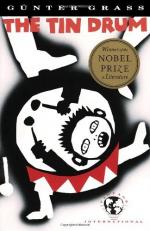|
This section contains 455 words (approx. 2 pages at 400 words per page) |

|
Despite Grass's assertions that his novels have no specific meanings, it is obvious that his social concerns and themes are inextricably interwoven in all of his works. The Tin Drum covers the period from the 1920s through the 1950s and ranges from Danzig to Germany and France. Oskar Matzerath's odyssey through the nightmare of Nazism has been interpreted as a parable for the German experience, but it should not be seen as a precise allegory. As do many Postmodern stylists, Grass insists that there are no "meanings" in his works, that he is interested in language and style, not extraneous abstractions. He has said, "So many of them [critics] look for symbols and allegories and deeper meanings, but sometimes I write of potato peels and mean potato peels."
His denials to the contrary, all his work is rich with archetypal overtones, which are simultaneously universal and...
|
This section contains 455 words (approx. 2 pages at 400 words per page) |

|




